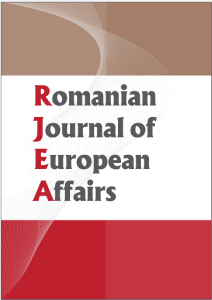The Crucial Themes of EU Enlargement
Jacques Pelkmans
Abstract:
This article provides a critical review of the “terms” of the ongoing EU enlargement, in the light of the European public interest. The European public interest ought to include the prospective (Central European) members, within a perspective of an enlarged Union in 2010, or so. The following forms a personalised summary of a major report published (in Dutch) in September 2001 by the WRR in The Hague (a think-tank, formally under the Dutch Prime Minister, but by statute fully independent). The author was one of the lead-writers of this report. The present article merely focuses on the policy recommendations of the report. It is hoped that these kinds of critical analyses will help to stimulate solid policy debate on the EU in Romania, on the road to EU membership. The article discusses why the notion of a “core-acquis” would improve the enlargement strategy; the application of the core acquis to the internal market, environment and justice and home affairs; judicial and administrative capacity; accession to “euro-land”; the rapid reform of the CAP; a reform of “cohesion” approaches; and a note on the EU budgetary implications.
Keywords: CAP, core- acquis, EU budget, EU enlargement, internal market
Lărgirea Uniunii Europene: întărirea capacităţii de candidat a României
Eugen Dijmărescu
Abstract:
The EU enlargement raises many questions to Member States, among which the institutional framework of the future Europe is a major topic. For the candidate countries, the enlargement raises at least two major issues: (a) what the new Europe would look like and how much welcome they are in; (b) what efforts should they commit to cope with the existing gaps to become equal partners and not just poor kin? The report debates Europe’s concern for enlargement as mirrored through the Romanian eyes. While discussion goes on about Federalism vs. a Europe of Nations, Romania strives to cope with her imbalances, inherited from the past and developed by a stop-and-go reform decade. For the candidate countries, the vision on the future Europe cannot be political only. The success of the enlargement should go through a wider reform than EU institutions and their weighted power by national parliaments or governments. It must be also built by taking care of the right policies to address economic distortions across Europe.
Keywords: EU enlargement, EU institutions, federalism, Romania
The Role of the Economic Dimension in Conflict Prevention in Europe
Daniel Dăianu
Abstract:
The article was originally delivered as a discourse at the UNECE/OSCE International Conference “The Role of the Economic Dimension in Conflict Prevention in Europe”, Villars, Switzerland, November 19, 2001. It therefore attempts at a reexamination of the economic and environmental dimension of security, emphasizing the urgent need of maximizing the effort of identifying security risks and tackling them in terms of early warning and conflict prevention. Due to the specific initial format of the text, minor editing has been operated.
Keywords: conflict prevention, early warning, EU economy, OSCE, Security
Consideraţii cu privire la implicaţiile constituţionale ale aderării României la Uniunea Europeană
Aurel Ciobanu-Dordea
Abstract:
By creating the European Union, the constitutive states gave a strong political dimension to the European Communities, transferring the exercise of competences until then strictly developed at the national level. The transfer has been irreversible and it involved a growing number of competences that set the basis of a new judicial order, a monist one. This is the new community judicial order, which incorporates the national judicial orders of those states and presents a number of specific characteristics (elaborated upon section 1). In order to respect the assumed commitments and to take into account their consequences, the member states operated changes of their national constitutional frameworks, the most significant aspects of those being worth to be presented (in section 2). Finally, since the establishment of these organizations, an enormous patrimony of rules, practices and evaluations regarding the European Union’s and member states’ fundaments of the political and judicial system has been accumulated. Romania must take into account the implications of the acquis communautaire (see section 3), like any other candidate country to the European Union.
Keywords: acquis communautaire, community law , judicial order, national constitution
Impozitele din România: o comparaţie regională
Valentin Lazea
Abstract:
The author provides a comparative analysis of taxation in the six Central European candidate countries to EU integration: Czech Republic, Poland, Slovakia, Slovenia, Hungary and Romania. As the focus is primarily on Romania, this complex topic raises many questions, most of which relate to the way in which the government should improve the taxation system. To which extent the level of taxation differs in Romania from those of other applicants in Central Europe? Which are the main causes influencing the pattern of collecting the budgetary benefits? How the Romanian taxation system can be restored to good health?
Keywords: Czech Republic, Hungary, Poland, Romania, Slovakia, Slovenia, taxation
Evolution et difficultes de l’harmonisation legislative dans le domaine de l’environment
Mircea Dutu
Abstract:
Romanian environment legislation is currently undergoing a fully-fledged transformation, modernization and Europeanization process. Various internal and external factors influence the adoption of new regulations establishing modern instruments focused on environment protection and institutions that are increasingly adequate in managing this complex task. While acknowledging that the modernization of the legislation is obviously necessary, the author warns against possible contradictions between the modern (legislative) form and a specific (social-economical Romanian) content that might generate disfunctions and convulsions in the harmonization process.
Keywords: environment legislation, legislative harmonization, Romania
Integrarea României în Uniunea Europeană, competitivitate şi convergenţă
Constantin Ciupagea, Amalia Fugaru
Abstract:
Integration in the EU can only be successful if institutional and economic convergence is achieved. This article analyses Romania’s current situation as regards the degree of economic convergence with the EU countries. The first half of the paper explains the role of competitiveness in generating economic convergence and assesses the relative importance of the macro and micro determinants of competitiveness, both theoretically and empirically. In the second half, a theoretical framework for the analysis of the convergence phenomenon is provided, on the basis of which Romania’s convergence is assessed.
Keywords: competitiveness, convergence, economic development, Romania
Combating Mythology and Changing Reality: the Debate on the Future of Europe
Richard Corbett
Abstract:
As the enlargement of the EU fuels intense debate on the future of Europe, as a unified, single voiced and hopefully more efficient actor on a global scene, a clear cut assessment of the implications of such processes at national level is needed. As it enlarges its membership, the Union will become a macrocosm of progressively more diverse national interests, which need to dissolve into a unitary and articulated international presence. Against this background, the article looks at the implications of this process, within the framework of the powerful dichotomy federalism-centralism. Indeed, the EU is composed of strong member states with different cultures, which will retain large areas of their own competence; however, the author concludes, they will at the same time play a major role in the EU’s own decision taking, make it an unusually decentralized federation, and not a centralized superstate. In exploring the case of the UK, one of the most prominent actors within the Union which has difficulties coming to terms with its role within a wider Europe, the author attempts to demystify the euro-sceptic legends on Bruxelles taking over power from London and offer an objective overview of the institutions and processes that take place within this decentralized federation. The discussion on the future of Europe, the article concludes, should be translated from diplomatic channels to the citizens’ level, so that “they are at ease” with their union; and this will not be achieved through creating complex new institutions and multi tiered structures, but by objectively assessing, consolidating and improving what was achieved so far.
Keywords: centralism, EU enlargement, EU institutions, federalism
Sunt criteriile de convergenţă incompatibile cu o strategie orientată spre creştere?
Lucian-Liviu Albu
Abstract:
Considering the prospects of Romania’s intehgration into European Union (EU), the fundamental objctive is the creation of a functioning market economy, compatible with the Union’s norms, mechanisms, institutions and policies. Hence, the convergence that is presently taking shape, should be primarily built on a proficient evaluation of the specific capabilities, as well as of the national and international circumstances. In the case of Romania, there is a double imperative: first, concluding the transition to the market economy and second, a successful preparation of the integration into the EU. This article attempts to asses the theory of incompatibility between the convergence criteria (the so-called Maastricht criteria) and the growth-oriented economic policies, since the real evolution of the national economy looks constrained by the fetters of a “vicious circle” characterized by the deepening of the gaps in productivity and living standard compared with the situation in the EU.
Keywords: convergence criteria, growth, Maastricht criteria, Romania






